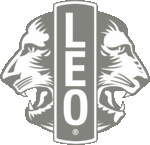Leo clubs
| Leo Club Program | |
|---|---|
 Leo Logo | |
| Motto | Leadership, Experience, Opportunity |
| Formation | 1957 |
| Purpose/focus | Youth secular service club |
| Headquarters | Oak Brook, IL |
| Membership | 160,000 in 140 countries |
| Parent organization | Lions Clubs International |
| Website | http://leoclubs.org |
The Leo club objective is to "...to provide the youth of the world (with) an opportunity for development and contribution, individually and collectively, as responsible members of the local, national and international community."[1]
Leo clubs encourage youths to develop leadership qualities by participating in social service activities. They are dependent on a Lions club to sponsor and initiate a Leo club. Leo Club members are addressed as "Leos." They conduct various projects in the fields of health care, elders, children, differently abled, literacy and education, and self-development. Leos can raise funds by conducting fund-raising projects. They can conduct projects with another Leo club, sponsoring Lions club, or with an outside organization. Leo clubs are sponsored by Lions clubs and comprise an official program of Lions Clubs International.
History
The first Leo club was founded in 1957 by Jim Graver, the coach of the Abington High School, Pennsylvania baseball team. He was an active member of the Glenside Lions Club. The club was founded with the help of William Ernst, another local Lion. It adopted the high school's colors of maroon and gold. The club also created the acronym Leadership, Equality, Opportunity for the word Leo. The word equality was later changed to experience.[2]
In 1964 the Leo Club Program became a sponsored program of the Lions district. It grew beyond Pennsylvania and the United States of America. By 1967 the program had grown to over 200 clubs in 18 countries and become an official youth program of Lions Clubs International. In the following year, the Leo Club Program spread rapidly, more than quadrupling in size, to 918 clubs in 48 countries by the end of 1968.[3]
Purpose
The stated purpose of the Leo Club Program is:
"To promote service activities among the youth of the community which will develop the individual qualities of Leadership, Experience and Opportunity. To unite its members in friendship, fellowship and mutual understanding."[4]
Alpha and Omega Leo Clubs
There are two tracks of the Leo Club Program. Alpha Leo clubs are those that consist of members between 12 and 18 years of age. Omega Leo clubs are those that consist of members between 18 and 30 years of age.

The Leo Club Program's maximum age of membership is 30 years of age, though it is at the discretion of the Lion's district to enforce younger upper-age limits for Omega clubs. There are no major differences in the operations or logistics of Alpha and Omega Leo Clubs. [5]
In addition to the Alpha and Omega tracks, Leo clubs should also designate whether they are school based or community based.
Membership
Leo clubs are composed of young people of good character who are members of the local community. Before joining a club, youth should complete the Application for Leo Club Membership and review new member materials that are to be provided by the sponsoring Lions club. Clubs meet regularly and should maintain frequent contact with their sponsoring Lions club. Leos elect a leadership team of officer which includes the President, Secretary, Vice President, Treasurer, and Directors.
When six or more Leo clubs are sponsored within an existing Lions district, the district governor may approve the formation of a Leo district. The Leo district president is elected annually at the Leo district conference. When ten or more Leo clubs are sponsored within an existing Lions multiple district, the council of governors may approve the formation of a Leo multiple district. The Leo multiple district president is elected annually at the Leo multiple district conference.
References
- ↑ "Leo Club Motto". The International Association of Lions Clubs. Retrieved 2013-08-08.
- ↑ "Leo Club History". The International Association of Lions Clubs. Retrieved 2010-03-20.
- ↑ "Leo Clubs - Bring New Energy to your Lions Club". The International Association of Lions Clubs. Retrieved 2010-03-20.
- ↑ Standard Leo Club Constitution and Bylaws, Oak Brook, Illinois: The International Association of Lions Clubs, 2006
- ↑ "Common Questions about the Leo Club Program". The International Association of Lions Clubs. Retrieved 2010-03-20.
External links
- Lions Clubs International | Leo Zone
- Lions Club International
- Leo Clubs of Switzerland
- Leo Clubs of Austria
- Leo Clubs of France
- Leo District 306 A2 of Sri Lanka